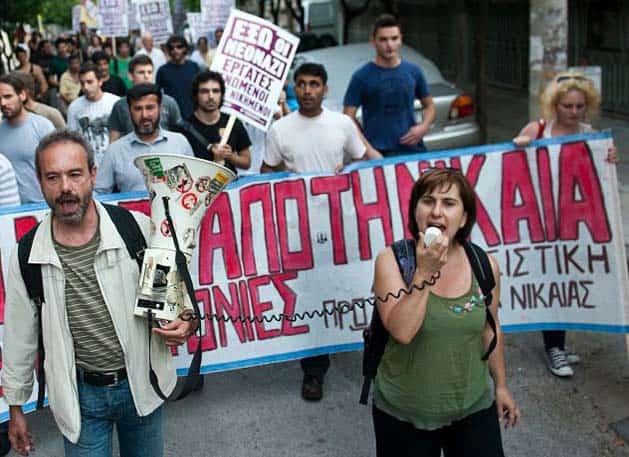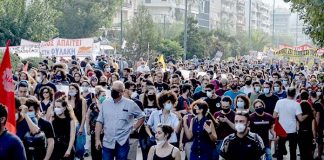Katerina Thoidou is a candidate for ANTARSYA (an anti-capitalist coalition) in the upcoming Greek elections and a member of the Greek Socialist Workers Party (SEK).
She is on the central committee of KEERFA (United Against Racism and the Fascist Threat), an organisation which campaigns against Golden Dawn and for the rights of migrant workers. In July last year, she along with three other journalists at SEK’s Workers Solidarity newspaper were sued by Golden Dawn, but all charges were dismissed in court.
She spoke to Jimmy Yan about the current political situation in Greece, and the possibilities for a left government.
Describe the current situation in Greece. What is the broader context for the early elections on January 25?
Since the economic crisis reached Greece, many thousands of ordinary people have waged years of struggle against the government, against austerity and against fascism. We have defeated three governments, and now we are about to defeat a fourth.
Antonis Samaras was obliged to call early elections because he couldn’t govern anymore. He could vote in parliament for all the new austerity measures the Troika asked the government to implement, but it was ultimately impossible for him to implement them.
It couldn’t bring in these new measures because of years of workers’ resistance.
What is the mood on the ground, at a street level and at a workplace level in relation to the possibility of a left government? What are people’s hopes and expectations in SYRIZA?
The government of New Democracy and Pasok has tried hard to put fear in people by saying that if Greece leaves the European Union or if Syriza forms government, we will not have any money in the banks, that people will be poor, and that we will not have any money left to fund public schools or hospitals. They have tried to play the fear card, but people don’t care anymore. They don’t believe the government.
New Democracy is in decline, and Pasok is now dividing in two. We now see two lead candidates who have their political origins in Pasok—the current leader Evangelos Venizelos and the former president George Papandreou who recently formed a new party. The two parties which once held 70 per cent of the vote some years ago now hold about 20-25 per cent together.
People are moving to the left, and it’s very important to note that this shift to the left is a product of the strikes and struggles we have had over all these years. Through years of taking to the streets, making strikes and occupations, people understood that the only way to defend their living standards is through resistance. This resistance has as a result made the left bigger.
That’s why everyone is hoping that if we build a bigger and stronger left then we can fight for a better life. Syriza is the first party to have gained from this tide to the left.
How can a left government build the confidence of the movement against austerity?
Some years ago in 1981, we had a similar change in political conditions in Greece. We had Pasok who gained power for the first time, and at that point they gained about 45-45 per cent of the vote. People voted for PASOK because they didn’t want the right anymore.
In the following decade, people continued to wage battles under the PASOK government even if they voted for them. I think that is what is going to happen now. It will be increasingly likely that people who vote for Syriza will not just passively stay and watch what is happening. They will vote for Tsipras but they are also very willing to fight, and to take back everything that has been stolen from them over these years—their jobs, their salaries.
Syriza have promised that they will take measures to end austerity and improve people’s lives. However, I believe that in the conditions of the current crisis, it is going to be very difficult for any government to restore a decent life to people without struggle from below. People are very willing to fight. It is going to be a very political period after the election.
Can you talk about the question of the debt?
Syriza says that Greece should stay in the European Union. When the right parties threaten that the European Union will expel Greece if Syriza forms government, the response of Tsipras and the Syriza leadership has been to reassure them that that this is not going to happen for fear of alienating voters.
Our argument in Antarsya is that workers have the power to fight for another alternative, against capital. That’s why we are campaigning around an Anti-Capitalist Memorandum. We say that we should make any changes under a left government go “to the end”, not just to change the government but to change our whole life.
We have been trying to offer answers to counter the ideological war and fear campaign of the right parties. We say that we have another solution, we have an anti-capitalist solution. We say that we should not pay the debt. We should nationalise the banks under workers’ control. We should get out of the European Union and we should place all factories that are closing down under workers’ control. Workers themselves should place factories and corporations under workers’ control, and keep them open. That will be the only way to stop unemployment.
What’s the current state of class struggle in Greece?
There have been many long-term struggles. There is the struggle of workers at ERT, there is the struggle of cleaners who have been occupying the outside of the Ministry of Finance for eight months, and there is the struggle of school guards who were laid off. All three are demanding reinstatement following mass sackings.
Workers at the Coca-Cola factory in Thessaloniki have now been on strike for a year. There have also been strikes of hospital workers and teachers. And of course, there were big occupations in the universities and schools across Greece in November and December against new laws introducing privatisation and austerity into the education system.
The government said it would sack 6000 working people in the public sector. The ministry had wanted these sackings to go through in summer, but because of mass resistance, it failed to introduce these sackings. This was a very big achievement.
There is also a new strike of immigrant workers who work in a recycling factory in Athens. These workers had no past experience with unions or strikes. With the help of KEERFA and the Pakistani community, they organised a union and elected a committee. They then called an assembly and decided to go on strike. Even when the bosses sent the police to put them in jail, they were released and they succeeded in winning their pay.
As an anti-fascist activist, could you talk about the current state of the far-right? Are Golden Dawn now in decline?
Yes. Eight MPs of Golden Dawn are now in jail, which is a big achievement of the anti-fascist movement in Greece. This is because we built a huge anti-fascist movement across the whole of Greece following the murder of anti-fascist activist Pavlos Fyssas. On the first anniversary of his murder last September, there were large anti-fascist mobilisations demanding that Golden Dawn be put on trial, put in jail and jailed forever.
And now Golden Dawn is increasingly isolated. They have been forced to close their offices in several towns, one after another. They have stopped their killings and attacks on immigrants and the left. Although they are currently trying to present themselves to voters as a political party and not a criminal organisation, I think they will very much be on the decline in the upcoming elections.
How is Antarsya relating to the election period?
Antarsya have played a key role in the workers’ resistance, and its members have been involved in organising solidarity for all the strikes in Greece under austerity.
For example, Antarsya was the most important political group involved in the battle at ERT. It is also an important part of the anti-fascist movement, and works alongside Keerfa. Many people feel that Antarsya is a left force that can give people new hope by strengthening the battles in the coming period.
Many say that they would like Antarsya to be in parliament on the basis of all the work we have done all these years in the movements. People will be voting for Syriza against Samaras, but I think it is also important for Antarsya to gain a strong vote because after the election we will need to build more strikes and deepen the resistance to austerity.
What are the immediate tasks of the left after the election?
We will be building campaigns around five key demands after the election, as part of a five-point plan. The first campaign will be for a full cancellation of the debt. The second campaign will be against unemployment, to help people regain their jobs.
Thirdly, we will be building the anti-racist campaign. We must close the concentration camps, give papers to all the immigrants and open the borders for refugees. Fourth is the campaign to put Golden Dawn in jail forever.
The last campaign is the anti-war campaign. We don’t want the Greek government to be in alliance with the government of Israel or to support the wars of NATO in the Middle East.
A left government will face enormous opposition from European governments. How can people build international solidarity with the Greek people?
International solidarity is very important. First of all, we will need international solidarity on 21 March, the International Day Against Golden Dawn. We expect the international anti-fascist movement to support the fight in Greece, but also to stand against Islamophobia and racism elsewhere in Europe. It will be very important for the whole left across Europe to show that we don’t want governments to divide people between Muslims and non-Muslims. We want to fight together against austerity.
Next, the best form of support for the fight in Greece will be to build strikes and resistance all over Europe against the austerity measures of the European Union. It’s very nice to see workers on strike in places like Belgium, or in Spain and Italy. It’s an answer to the argument that we in Greece are going to be alone if we leave the European Union. When we see people fighting austerity measures across Europe, this gives us the strength to go on in our own fight against austerity.
The biggest challenge for people across Europe will be to build new anti-capitalist parties in order to send a message that there is another solution without austerity, without racism, without fascism. It is very important that out of this economic crisis, we build something new. We need a new kind of society. We don’t just want to destroy this government, we want to destroy capitalism. The message that Antarsya and SEK would like to send to working people throughout Europe is that there is another way: and it is only working-class people themselves who can fight for it.






